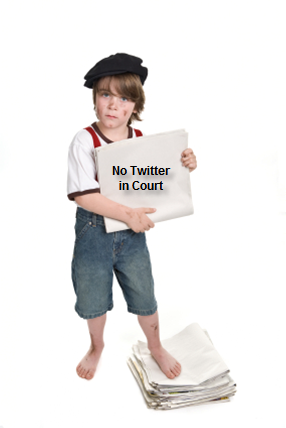 In United States v. Shelnutt, a member of the press requested the right to “Tweet” a criminal trial on Twitter. The court denied the request pursuant to Federal Rule of Criminal Procedure Rule 53. United States v. Shelnutt, 2009 U.S. Dist. LEXIS 101427 (M.D. Ga. Nov. 2, 2009).
In United States v. Shelnutt, a member of the press requested the right to “Tweet” a criminal trial on Twitter. The court denied the request pursuant to Federal Rule of Criminal Procedure Rule 53. United States v. Shelnutt, 2009 U.S. Dist. LEXIS 101427 (M.D. Ga. Nov. 2, 2009).
Federal Rule of Criminal Procedure Rule 53 states, in relevant part:
“[T]he court must not permit the taking of photographs in the courtroom during judicial proceedings or the broadcasting of judicial proceedings from the courtroom.” Shelnutt, at *2, citing Fed. R. Crim. P. 53
The Court held that the term “broadcasting” includes sending electronic messages contemporaneously from the trial, which the Court held includes Twitter. Shelnutt, at *2-3.
First Amendment Concerns
The Court held the First Amendment was not violated by the prohibition of Twitter in the courtroom.
The Court stated that Federal Rule of Criminal Procedure Rule 53 is well established as Constitutional. Shelnutt, at *4. Additionally, the Press has the right to attend the trial, listen to the evidence, evaluate the arguments and report on the proceedings. As such, there is no restriction on the right to report on the criminal trial. Shelnutt, at *4-5. In short, these sound like “time, place and manner” restrictions on where the broadcasting of a trial can occur.
Bow Tie Thoughts
This is a new spin on cameras in the courtroom. Just as a judge would prohibit reporters setting up a broadcast booth in her courtroom (and thus creating a media circus where lawyers put on silly hats and do bad rhymes during closing argument), it is understandable why a judge would not want a “Tweetup” taking place during a trial.

5 comments
Comments are closed.